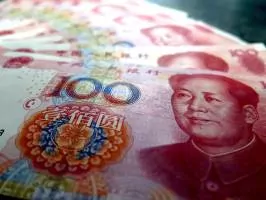
Currency Diversification Into Chinese Yuan
The Easiest Way To Hold Yuan
Five years ago, a friend recommended that I open an account with the Bank of China in New York. A Bank of China account is an easy way to hold yuan directly, something that, as my friend suggested to me years ago, every global investor should think about doing.
Finally, in New York City with my wife last week, I was able to take my friend’s advice by accident.
Looking for a place for lunch between Kathleen’s morning interview on Fox Business News and an afternoon meeting with the Wall Street Journal, we passed the Bank of China. Serendipity. We walked in to ask about opening an account.
An hour later, with the competent and efficient help of the charming Bank of China agent, we had U.S. dollar checking and yuan savings accounts. All we needed were two forms of ID and our Social Security numbers. Banks in the rest of the world nowadays want to see two forms of ID, a bank reference letter, maybe a reference letter from a professional contact (your attorney or accountant, for example), and maybe a copy of your most recent tax return. Then they hand over a stack of forms for you to complete.
That’s been my recent experience. In Panama, add unhelpful and sometimes surly bank agents to the mix for a full picture. The experience at Bank of China in New York was so dramatically different from any other I’ve had in so long that I’m tempted to try to open an account at the Bank of China operation in Panama to see how the process compares in that country.
My friend recommended holding yuan starting back in 2010 as a hedge against what he thought could be a big revaluation of the Chinese currency at some point. Financial pundits have been predicting a revaluation of the yuan for as long as I can remember… a decade at least.
The yuan was fixed at 8.26 to the U.S. dollar back in 2005 when it was allowed to begin appreciating slowly. Over the three years from July 2005 to July 2008, the yuan moved to 6.82 to the U.S. dollar, where it held steady for a couple of years before moving… again, slowly… to today’s fixed rate of 6.10.
Had I taken immediate action when my friend recommended opening a yuan bank account, I would have seen an 11% currency gain over five years. That’s an annualized return of about 2.7%—not very exciting but better than the interest I’ve earned from my U.S. dollar accounts during that period.
Currency Fluctuations
I make the point often that I don’t try to predict currency exchange rates. That’s a job for someone else. However, holding cash in different currencies as a hedge against exchange rate moves is something else and has always made sense to me. I like the idea of holding some yuan in a kind of back-up account. If the pundits are right and the yuan continues to appreciate against the U.S. dollar, I’ll be able to buy more dollars with my yuan in the future.
One positive factor about having my account at the Bank of China in the United States is that it doesn’t have to be included on my FBAR report each year. It’s a U.S. account. Not that it’d be a big deal for me to include another account on my FBAR. However, if you aren’t yet required to file an FBAR, you could diversify into the yuan through the Bank of China in New York without worrying about triggering that obligation.
Interest rates for yuan CDs aren’t great, but they’re a bit better than U.S. dollar interest rates for the same periods. So you could earn slightly better interest, albeit generally less than 2%, depending on the length of the CD, and expect some currency appreciation of your yuan holdings. It’s not a home-run investment, but the risk is low and the big upside is the currency diversification.
Unfortunately, you must go in person to open an account. That’s why it took me five years to follow through on this opportunity myself. Think of it as a good excuse for a trip to New York. Bank of China has two branches in Manhattan, one in Chinatown and one in Midtown.
Lief Simon
“Lief, I am confused about how my husband’s and my retirement annuities would move overseas or down south. He is on Social Security and USAR retirement. I am on CSRS federal government retirement and USAR retirement. Will the U.S. government continue our retirement annuities if we retire out of the country?
“Also, what about taxes on the four retirements?”
K.B.
Where you live has no bearing on your eligibility for Social Security or government pensions… unless you decide to live in North Korea or Cuba, in which case Social Security won’t pay you until you move on from either of those countries to somewhere else. Social Security can be direct deposited into bank accounts in a number of countries. To find out whether either of your other two pensions could be direct deposited overseas, speak with the plan administrators.
Note that giving up your U.S. citizenship would affect your military pensions but not your Social Security except in rare cases.



